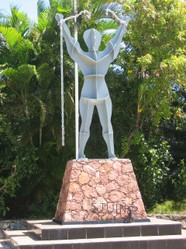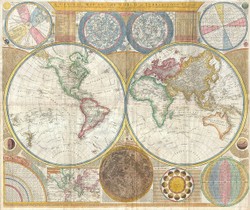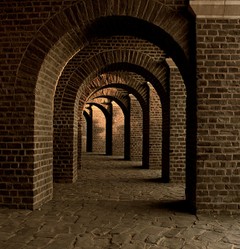There were two areas where primitive forms of slavery survived: the ISIS caliphate where female sex slavery was rife; and Mauretania, a pre-modern economy where hereditary slavery is still suffered by some families who undergo dire conditions. ISIS is thankfully destroyed, but Mauretania remains a problem.
The Indian subcontinent remains a problem with debt slavery afflicting whole families who are forced to work for pittances and can never pay off their debts. Sometimes the daughters of such families are sold into prostitution by the owners. This is a form of bonded labour, in which the worker is tied to an employer. Needless to say in such conditions wages are very low.Forced labour is another area in which certain states make citizens work for nothing, Turkmenistan being the prime example with its compulsory cotton picking. Construction projects in certain Arab states employ Philippine men, who have their passports taken, making them dependent on the employer for getting home. They are in effect slaves
Women and children suffer badly. Child slaves suffer all that adult slaves undergo. Women are lured into domestic service and underpaid, overworked and sexually exploited. And let us not think that the abuse is always male on female. Many female slaves have cruel mistresses.
Modern western economies exist in a society of highly mobile people and this is exploited by slavers. Women and vulnerable men are lured to foreign countries on the pretext of good jobs, but often the women discover that their fate is prostitution and the men find that they are tied to farms and construction projects in exploitative conditions. In the UK we suffer the problem that young Eastern European women, from countries where wages are low, are enticed to Britain and then caught in the sex trade. Vietnamese are lured, the women into nail bars and the males into cannabis farms. Another vulnerable group are homeless men, some of whom have been captured by traveller gangs and forced into slave condition in construction work or on unscrupulous farms. There was one Asian girl, deaf and dumb, sent by her family to England for a job. She was for years exploited and abused. The male who abused her got many years in jail, her cruel mistress, his wife, going down for a few years as well.
What can be done? We all need to be alert. Look out for situations where work is being done by vulnerable people for a price that seems too good to be true, for this suggests that the workers are slaves. Sign petitions to keep politicians on their toes. Give to charities that help the vulnerable escape slavery. Be careful to source clothes so that you purchase from companies where the supply chain is free from slave labour.
Only when all people are free from greed and the willingness to use violence to gain economic goods and services will slavery be ended. The price of freedom is endless vigilance, not just for yourself, but for all.










 TheThousand Year Gardenon 11/26/2025
TheThousand Year Gardenon 11/26/2025
 Women of the Gospelson 10/11/2025
Women of the Gospelson 10/11/2025
 Religious Gardenson 08/25/2025
Religious Gardenson 08/25/2025
 Doctor of the Church: John Henry Newmanon 08/03/2025
Doctor of the Church: John Henry Newmanon 08/03/2025




Comments
The weakness of England during the Norman conquest gave thevScotsvan opportunity, but the Normans gave them a good hammering.
Thank you for your comment below in answer to my previous observation and question.
Your comment three boxes down advises us of the Scots as taking "many English slaves right up to the Norman period."
Did the Norman victory at the Battle of Hastings end other British Isles-ers, such as Irish and Scots, even thinking of taking English inhabitants as slaves?
Welshnslavers probably joined in the English trade. Bristol, whichbisvclosevto Wales, was a big,,slave port.
Thank you for your comment below in answer to my previous observation and question.
It appears that at least three of the five nations in the British Isles slave-traded.
What about the Welsh? Were they slave-traders, slaves or neither?
Scots were serious slave raiders and took many English slaves right up to the Norman period.
Your comment below on Dec. 3, 2018, in answer to Veronica's previous, same-day observations and questions interests me.
Your comment invokes the British Isles with "The tale of Tristan and Isolde [Yseult] in the Matter of Britain recounts a clash between the Cornish and Irish slave raiders. The climax was the clash between Tristan, champion of Cornwall, and the Morholt, the giant champion of Ireland. Tristan won and the Irish [probably Leinstermen] were driven off. Britain in the immediate post-Roman age was a very violent place beset by Pictish, Irish and Saxon raiders."
Is it that only Cornish and Irish slave-traded or might English, Scots and Welsh ancestors have been involved too?
They were free, but many had to pay their own way home,which they could not afford, so they stayed. One such as Henry Morgan became a successful privateer and was eventually made governor of Jamaica.There are adverts for Captain Morgan rum with the key line "Live like the captain." However,living like the captain would involve burning down Panama City and eventually dying of drink, presumably from rum.
frankbeswick, Thank you for the back- and front-stories and product lines. Veronica asked about what happened to indentured servants once their time was up in the colonies. Bacon's Castle in Virginia, about which I've written, memorialized a rebellion that included concern over former indentured servants and poorer colonists settling the frontiers without protection or resources. In fact, that was a common way of pushing the proto USA ever further westward.
Thanks. However , my commitment to truth has resulted in my annoying people at times.
I am afraid students today are getting sanitized history far too often. we must recognize such things from the past. Making history politically correct serves no one. Frank, your work does not hesitate to bring out the whole truth. Thanks.